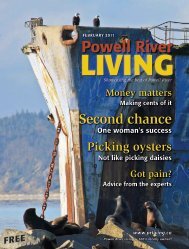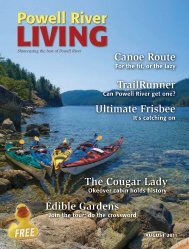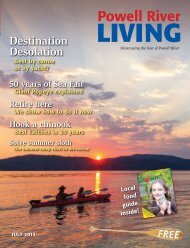Earth Day
Earth Day - Powell River Living
Earth Day - Powell River Living
You also want an ePaper? Increase the reach of your titles
YUMPU automatically turns print PDFs into web optimized ePapers that Google loves.
Time to plant<br />
By Jonathan van Wiltenburg<br />
Organic matter: The garden champion<br />
Organic matter, or humus, is the champion<br />
of the garden. In the natural environment,<br />
organic matter is found in the<br />
top layer of the soil, and is created when<br />
former living materials fall onto the soil<br />
surface and are broken down by a complex<br />
web of animals and microorganisms. It is<br />
what gives soil the dark complexion that is<br />
synonymous with highly fertile land.<br />
Organic matter has only advantageous<br />
effects on soil and plant health. It will increase<br />
the water holding capacity and percolation<br />
of your soil. Think of it like a rung<br />
out sponge. It holds water and keeps things<br />
moist, yet still provides needed air space.<br />
Organic matter not only supplies the nutrients<br />
themselves, but also increases the surface<br />
area that roots can absorb from. Organic<br />
matter increases the amount of air space<br />
in the soil structure, buffers changes in pH,<br />
neutralize toxins, and keep the soil cooler<br />
in summer and warmer in winter. This is<br />
an amazing asset for gardens.<br />
So how do you get the magical matter?<br />
The answer is through composting. It is<br />
the backbone of holistic gardening, and<br />
a must if growing organically. As gardeners<br />
there are some basic things to think<br />
about to have successful compost. Below<br />
are some composting tips.<br />
• When putting debris in the bin, layer<br />
your debris with soil. Avoid putting<br />
large amounts of one type of debris.<br />
Variety brings better results.<br />
Top Priorities for april<br />
1. If you have not already done so, begin<br />
turning over the garden. Mix in<br />
old compost from last year. Try not<br />
to compact the newly turned soil.<br />
2. Feed your fruit trees, berries, and<br />
other trees and shrubs. Use an appropriate<br />
fertilizer for the species.<br />
3. In you have not done so, prune<br />
back your and hydrangeas, buddleja,<br />
fuchsia, perovskia, and other<br />
plants that flower on present year<br />
wood. Also prune the shrubs that<br />
have already finished flowering:<br />
winter jasmine, forsythia, witchhazel,<br />
kerria, heather, etc.<br />
4. April is for lawn maintenance. If<br />
you plan on seeding, aerating or<br />
topdressing, now is the best time.<br />
5. Set out your mason bee houses and<br />
larvae. Watch them pollinate your<br />
fruit trees and berries.<br />
6. Sow your vegetable and flower seed.<br />
Sow squash lettuce, beets, spinach,<br />
greens, carrots, parsnips, chard, celery,<br />
early potatoes, leek, onion, and<br />
summer flowering annuals.<br />
7. Hold off on putting anything outside<br />
that cannot handle a potential frost<br />
(beans, tomatoes, squash, etc.)<br />
8. Harvest your early crop of rhubarb<br />
and possibly your asparagus.<br />
• Anything that was once alive can be<br />
composted. But some material will attract<br />
vermin including rats, raccoons,<br />
or bears.<br />
• If you plan on using your compost<br />
next year avoid woody debris. This<br />
will break down over time, but it won’t<br />
be ready for your garden next spring.<br />
Place it in a different pile that can be<br />
used even later.<br />
• Compost needs to breathe. Turn it over<br />
frequently, and add layers of straw or<br />
crumpled newspaper to increase the<br />
available air. Also ensure your bin has<br />
air vents on the outer walls.<br />
• Your pile needs to be moist but not<br />
soggy. Soggy compost is stinky compost.<br />
Avoid this by covering it during<br />
the rainy winter months.<br />
• The warmer the weather the faster it<br />
decomposes.<br />
• If you are unhappy with the rate of<br />
decomposition, add materials high<br />
in nitrogen. Some bear-neutral options<br />
are manure (especially chicken),<br />
feather meal, coffee grounds, seed<br />
meals, or urine.<br />
If you have any more questions about<br />
composting or other plant/garden related<br />
questions email me at edenhort@gmail.<br />
com.<br />
Jonathan van Wiltenburg has a degree in<br />
horticulture and runs Eden Horticulture<br />
Services.<br />
Home Town Service, Worldwide Presence<br />
POWELL RIVER<br />
Independently Owned and Operated<br />
4545 Marine Ave<br />
1.877.485.2742<br />
604.485.2741<br />
www.remax-powellriver-bc.com<br />
email: remax-powellriverbc@shaw.ca<br />
It’s time to get dirty. Spring bulbs are in.<br />
7050 Duncan Street Phone: 604 485-9878<br />
Powell RiveR living • april 2010 • 29



